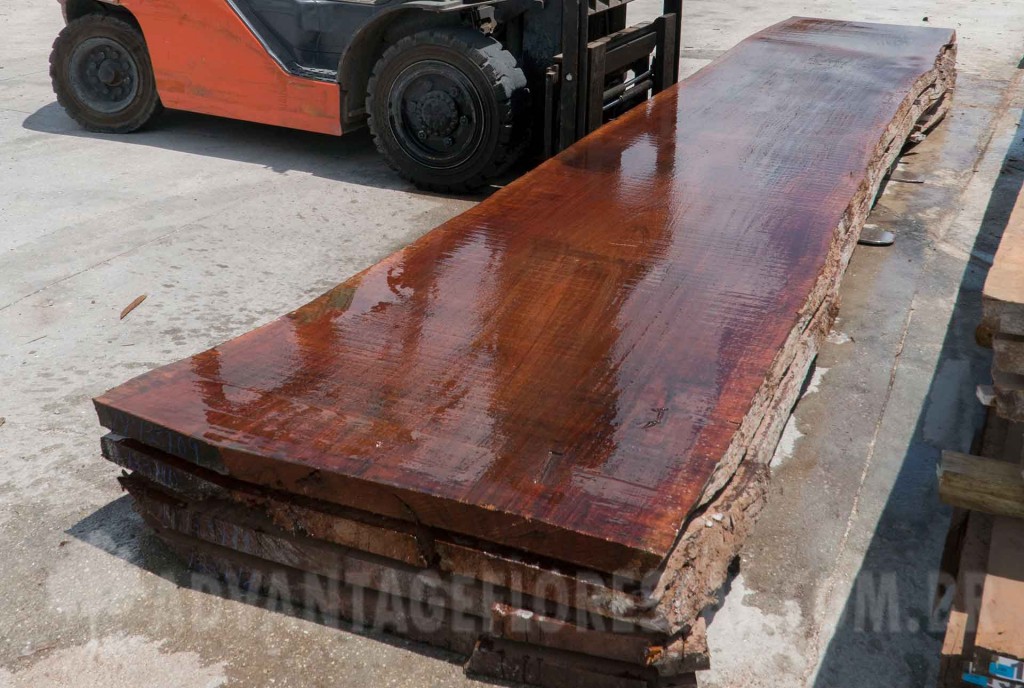
[php_everywhere]
Jatoba Wood Slabs
Jatoba is one of those woods that does so well in so many applications. It’s very versatile, rot resistant and naturally decay resistant. There is some grain tension with the wood being so dense and grain structure so tight. Some care has to be taken while surfacing a Jatoba slab due to grain tension. It can have some tear out but is easily solved if feed rates are slowed. It cross-cuts smoothly and sands very well. If it is going to be ripped with the grain, a riving knife is important. When Jatoba is in slab form it is stable and looks fantastic. When a piece is figured it’s like the grain has come alive throughout the slab. The grains almost flow into each other. One of the reasons people don’t use Jatoba as a slab is because they are so used to seeing it as flooring. It has a really thin sapwood line that is distinctly demarcated. The live edge shows off how the grain will be figured in places and its possible to see how the tree has grown. This is a whole new way to look at Brazilian Cherry instead of the traditional flooring application. Imagine being able to offer a live edge slab for a counter top or table top that matches a beautiful floor that someone just bought from you. A few reasons only the highest grade logs are used for slabs are • Slabs have the highest yield of any form and using the most wood out of a tree is imperative to sustainable harvest which we are committed to • A slab that comes from a lesser quality log will be prone to be less stable • Voids in some logs means that they would not be suitable for slabs Not many companies have thought of leaving Courbaril in slab form because of its high value as flooring. We believe that offering some of our Jutai in the highest possible yield is imperative to keep our wholesalers competitive in an ever changing wood world. Our experience with Jatoba means you can always be assured that we will supply you the very best. Give us a call or email us to see what we have available or what we are expecting to be available shortly.
Common Name: |
Jatoba, Brazilian Cherry |
Botanical Name: |
Hymenaea courbaril |
Indigenous to: |
Central America, southern Mexico, northern South America, and the West Indies |
Modulus of Rupture: |
22,510 lbf/in2 (155.2 MPa) |
Shrinkage: |
Radial: 4.2%, Tangential: 8.0%, Volumetric: 12.1%, T/R Ratio: 1.9 |
How is it dried: |
Info coming soon |
Is it dried quickly: |
Normal drying time Initial air drying under cover prior to kiln drying is recommended. Risks of cracks more or less important according to specific gravity. |
Stability: |
High Moderately Stable to Stable |
Exterior Wood Recommendation: |
Class 3 – not in ground contact, outside |
Fastening Method: |
Nailing/screwing: good but pre-drilling is necessary Gluing: Yes (for interior only) Note: Gluing must be done with care (very dense wood). |
Ecosystem impact: |
This wood species is not listed in the CITES Appendices, and is reported by the IUCN as being a species of least concern. |
Toxicity and allergic reactions: |
Although severe reactions are quite uncommon, Jatoba has been reported to cause skin irritation. |
Odor: |
No distinguishable odor |
Products we manufacture using this species: |
Info coming soon |
Other common uses: |
Cabinetwork (high-class furniture)Furniture or furniture components
Sliced veneer Industrial or heavy flooring Flooring Stairs (inside) Wood frame house Exterior joinery Exterior paneling Interior paneling Tool handles (resilient woods) Turned goods Shipbuilding (ribs) Vehicle or container flooring Musical instruments Arched goods Wood-ware Sculpture Moulding Cooperage |
Susceptibility to |
|
Dry Wood borers: |
Durable – sapwood demarcated (risk limited to sapwood) |
Fungi: |
Class 2-3 – durable to moderately durable |
Termites: |
Class M – moderately durable |
Treatability: |
Class 4 – not permeable |
Janka Hardness: |
|
More Product Information